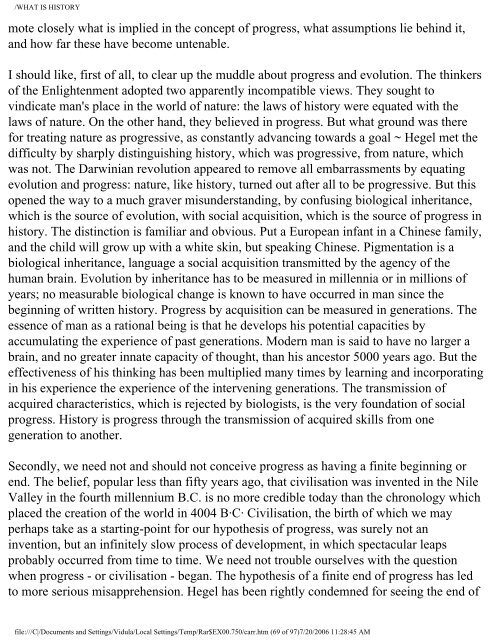What is History / by Edward Hallett Carr - Universal History Library
What is History / by Edward Hallett Carr - Universal History Library
What is History / by Edward Hallett Carr - Universal History Library
You also want an ePaper? Increase the reach of your titles
YUMPU automatically turns print PDFs into web optimized ePapers that Google loves.
WHAT IS HISTORY<br />
mote closely what <strong>is</strong> implied in the concept of progress, what assumptions lie behind it,<br />
and how far these have become untenable.<br />
I should like, first of all, to clear up the muddle about progress and evolution. The thinkers<br />
of the Enlightenment adopted two apparently incompatible views. They sought to<br />
vindicate man's place in the world of nature: the laws of h<strong>is</strong>tory were equated with the<br />
laws of nature. On the other hand, they believed in progress. But what ground was there<br />
for treating nature as progressive, as constantly advancing towards a goal ~ Hegel met the<br />
difficulty <strong>by</strong> sharply d<strong>is</strong>tingu<strong>is</strong>hing h<strong>is</strong>tory, which was progressive, from nature, which<br />
was not. The Darwinian revolution appeared to remove all embarrassments <strong>by</strong> equating<br />
evolution and progress: nature, like h<strong>is</strong>tory, turned out after all to be progressive. But th<strong>is</strong><br />
opened the way to a much graver m<strong>is</strong>understanding, <strong>by</strong> confusing biological inheritance,<br />
which <strong>is</strong> the source of evolution, with social acqu<strong>is</strong>ition, which <strong>is</strong> the source of progress in<br />
h<strong>is</strong>tory. The d<strong>is</strong>tinction <strong>is</strong> familiar and obvious. Put a European infant in a Chinese family,<br />
and the child will grow up with a white skin, but speaking Chinese. Pigmentation <strong>is</strong> a<br />
biological inheritance, language a social acqu<strong>is</strong>ition transmitted <strong>by</strong> the agency of the<br />
human brain. Evolution <strong>by</strong> inheritance has to be measured in millennia or in millions of<br />
years; no measurable biological change <strong>is</strong> known to have occurred in man since the<br />
beginning of written h<strong>is</strong>tory. Progress <strong>by</strong> acqu<strong>is</strong>ition can be measured in generations. The<br />
essence of man as a rational being <strong>is</strong> that he develops h<strong>is</strong> potential capacities <strong>by</strong><br />
accumulating the experience of past generations. Modern man <strong>is</strong> said to have no larger a<br />
brain, and no greater innate capacity of thought, than h<strong>is</strong> ancestor 5000 years ago. But the<br />
effectiveness of h<strong>is</strong> thinking has been multiplied many times <strong>by</strong> learning and incorporating<br />
in h<strong>is</strong> experience the experience of the intervening generations. The transm<strong>is</strong>sion of<br />
acquired character<strong>is</strong>tics, which <strong>is</strong> rejected <strong>by</strong> biolog<strong>is</strong>ts, <strong>is</strong> the very foundation of social<br />
progress. H<strong>is</strong>tory <strong>is</strong> progress through the transm<strong>is</strong>sion of acquired skills from one<br />
generation to another.<br />
Secondly, we need not and should not conceive progress as having a finite beginning or<br />
end. The belief, popular less than fifty years ago, that civil<strong>is</strong>ation was invented in the Nile<br />
Valley in the fourth millennium B.C. <strong>is</strong> no more credible today than the chronology which<br />
placed the creation of the world in 4004 B·C· Civil<strong>is</strong>ation, the birth of which we may<br />
perhaps take as a starting-point for our hypothes<strong>is</strong> of progress, was surely not an<br />
invention, but an infinitely slow process of development, in which spectacular leaps<br />
probably occurred from time to time. We need not trouble ourselves with the question<br />
when progress - or civil<strong>is</strong>ation - began. The hypothes<strong>is</strong> of a finite end of progress has led<br />
to more serious m<strong>is</strong>apprehension. Hegel has been rightly condemned for seeing the end of<br />
file:///C|/Documents and Settings/Vidula/Local Settings/Temp/Rar$EX00.750/carr.htm (69 of 97)7/20/2006 11:28:45 AM







